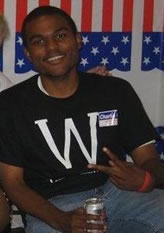One of the must read books of the summer is the Booker T. Washington: Uncle Tom or New Negro. The book in many aspects shows how many black celeberties (P. Diddy, Jay-Z, etc..) are following some of the same philsophies generations later. The book is based pretty much on interviews from 20 interviees broken up into essays. From the American Heritage magazine Christine Gibson writes:
"20 prominent African-Americans weigh in on those questions in Uncle Tom or New Negro: African Americans Reflect on Booker T. Washington and Up From Slavery 100 Years Later (Harlem Moon, $15.95), a new compilation of essays drawn from interviews conducted by the author Rebecca Carroll. Washington serves as a jumping-off point for a debate about issues of tribalism, permissible vs. impermissible blackness, what’s right and wrong about hip-hop culture, the gains and shortfalls of the civil rights movement, and modern black leadership."
Going further into the book review:
"Although most of the interviewees in Uncle Tom or New Negro believe Washington had the best interests of blacks at heart, they disagree about the morality of his methods. To build Tuskegee and keep it afloat, he relied on white benefactors, since no black Americans at the time had enough wealth to donate, and he had to play a game with those whites. He charmed huge sums from the Carnegies and Rockefellers, but many feel that to keep the money flowing he sold blacks short, by saying what whites wanted to hear.
Nearly everyone agrees that Washington was looking for the best way to prepare blacks, who had just emerged from centuries of slavery with little or no formal education, to make their way in a horribly racist society. Northern intellectuals could perhaps afford to think about education and social change in the long term; impoverished Southern blacks needed to put food on the table right away. The author Debra Dickerson reminds us that Washington risked being lynched because of what activism he did show. Others, like the filmmaker Avon Kirkland, argue that regardless of the context Washington’s segregationism held blacks back and may continue to do so today.
The book’s consensus, if there is one, is to favor Washington’s economic policy, which encouraged self-sufficiency, and ignore the outdated accomodationist parts of his message. Washington sought economic equality for blacks first, expecting it to serve as a base for political and social equality. But as history has shown, true economic parity comes last if and when it comes. Whether because blacks have forgotten Washington’s teachings or because his tactics were ineffective or harmful, 40 years after the civil rights movement, black business ownership today is still nowhere near on a level with that of whites. Now may be the time to focus on the economic advancement Washington concentrated on 100 years ago. As Cora Daniels says in Uncle Tom or New Negro, if Washington were alive today “his approach would be much more on point; now is when we need black folks to care more about ownership of self and work, more so than of material excess.""
Nathaniel Peete Jr.
Jun 19, 2007
Subscribe to:
Post Comments (Atom)





1 comment:
Wow! I never knew a site like this existed. So sad to see products of HBCUs so misguided and led astray. If you think the GOP cares about you, then you must not understand history or present-day reality. I hope this GOP thing is a phase for all the young people on this site. I really hope so.
Post a Comment